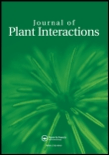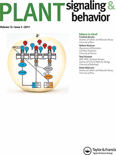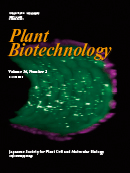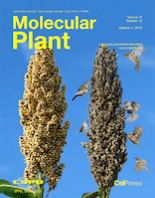
Journal of Plant Interactions
Scope & Guideline
Connecting Research and Insights in Plant Science
Introduction
Aims and Scopes
- Plant-Microbe Interactions:
The journal covers research on how plants interact with various microorganisms, including beneficial microbes and pathogens, exploring mechanisms of resistance, symbiosis, and mutualism. - Abiotic Stress Responses:
Research examining how plants respond to abiotic stresses such as drought, salinity, and extreme temperatures. Studies often include physiological, biochemical, and molecular analyses. - Genetic and Molecular Mechanisms:
Focus on the genetic and molecular basis of plant traits and responses, including gene expression profiling, transcriptomics, and the role of specific genes in stress tolerance. - Plant Growth Promotion:
Studies investigating the use of plant growth-promoting bacteria (PGPB) and biostimulants to enhance plant growth and resilience under adverse conditions. - Ecological and Environmental Interactions:
Research on plant interactions within ecosystems, including competition, allelopathy, and the effects of environmental changes on plant communities. - Innovative Agricultural Practices:
Exploration of novel agricultural techniques and technologies aimed at improving crop yield and sustainability, including the use of nanotechnology and bioremediation.
Trending and Emerging
- Nanotechnology in Agriculture:
The application of nanotechnology, including nanoparticles and nanobubbles, is gaining traction for its potential to enhance plant growth and stress tolerance, showcasing innovative approaches to improve agricultural practices. - Plant-Microbe Symbiosis:
There is an increasing focus on the beneficial relationships between plants and microbes, particularly endophytes and mycorrhizal fungi, and how these interactions can enhance plant resilience and productivity. - Environmental Stress Mitigation:
Research on the mechanisms by which plants cope with environmental stresses, particularly in the context of climate change, is becoming more prominent, emphasizing the need for resilient crop varieties. - Metabolomics and Phytochemistry:
Emerging studies utilizing metabolomics to understand plant responses to stress and their biochemical pathways are on the rise, offering insights into plant health and productivity. - Space Agriculture:
Innovative research exploring plant growth and interactions in space environments is gaining attention, reflecting the need for sustainable practices as humanity looks towards extraterrestrial agriculture. - Genomic and Transcriptomic Approaches:
There is a significant trend towards using high-throughput genomic and transcriptomic techniques to unravel complex plant responses to biotic and abiotic stresses, facilitating the development of resilient crop varieties.
Declining or Waning
- Traditional Breeding Techniques:
Research related to conventional plant breeding methods has decreased as molecular techniques and genetic engineering gain more traction and interest among researchers. - Invasive Species Studies:
The exploration of invasive plant species and their impacts on ecosystems has become less prevalent, possibly overshadowed by more pressing issues related to climate change and sustainability. - Basic Plant Physiology:
While foundational studies in plant physiology remain important, there is a noticeable shift towards more applied research that integrates physiology with molecular biology and environmental interactions. - Single-Species Studies:
Research focusing solely on individual plant species without considering ecological interactions is becoming less common, as there is a growing recognition of the importance of studying plant interactions within communities. - Laboratory-Based Studies:
There is a decline in purely laboratory-based experiments, with a trend towards more field-based studies that consider real-world applications and environmental complexities.
Similar Journals

Plant Signaling & Behavior
Exploring the Intricacies of Green IntelligencePlant Signaling & Behavior is a prestigious journal published by TAYLOR & FRANCIS INC, dedicated to advancing the understanding of the complex signaling mechanisms and behavioral responses of plants. With an ISSN of 1559-2316 and an E-ISSN of 1559-2324, it has firmly established itself in the field of Plant Science, earning a Q1 ranking in the 2023 category quartiles and ranking #83 out of 516 in Agricultural and Biological Sciences, placing it in the 84th percentile according to Scopus metrics. The journal serves as a vital platform for researchers and professionals looking to publish innovative studies and reviews that explore the intricate relationships between plant behavior and environmental signaling. With coverage spanning from 2006 to 2024, Plant Signaling & Behavior not only enhances academic discourse but also supports the growing interdisciplinary nature of plant sciences. Although the journal is not open access, it remains a significant resource for students, researchers, and practitioners aiming to deepen their understanding of plant signaling and its implications for ecology and agricultural practices.

PROTOPLASMA
Elevating Scientific Discourse in Cell and Plant ResearchPROTOPLASMA is a prestigious academic journal published by Springer Wien, dedicated to advancing knowledge in the fields of Cell Biology, Plant Science, and related areas of Medicine. Established in 1926 and continuing through 2024, this journal boasts a rich history of scholarly contributions and is currently indexed with a notable ranking in various disciplines: it stands in the top quartile (Q1) in Plant Science, the second quartile (Q2) in miscellaneous Medicine, and the third quartile (Q3) in Cell Biology as of 2023. With robust Scopus rankings placing it in the 86th percentile in Plant Science and a solid position in Cell Biology, PROTOPLASMA is recognized for its commitment to high-quality research and innovative findings. Although the journal does not offer open access options, it remains a valuable resource for researchers, professionals, and students seeking to explore the cellular and molecular underpinnings of plant life and its implications in broader biological contexts. Based in Austria, PROTOPLASMA serves as a vital forum for disseminating pioneering research that shapes the future of scientific inquiry in its respective fields.

Plant Biotechnology
Shaping the Future of Crop Innovation.Plant Biotechnology is a distinguished journal published by the Japanese Society for Plant Cell and Molecular Biology, committed to advancing the field of plant biotechnology through the dissemination of high-quality research. With an ISSN of 1342-4580, this journal caters to a global audience interested in agronomy, crop science, and plant molecular biology. The journal has achieved notable rankings, including Q2 in Agronomy and Crop Science and Q2 in Plant Science, underscoring its relevance and impact in these fields according to the latest 2023 metrics. Furthermore, it holds a respectable position within Scopus rankings across multiple categories, indicating its contribution to the academic community. Although it is not an open-access journal, its regular publications, spanning from 1997 to 2024, feature cutting-edge studies that explore innovative approaches and technologies in plant science. Researchers, professionals, and students will find Plant Biotechnology an essential resource for staying informed on significant advancements and trends in plant research.

BIOLOGIA PLANTARUM
Cultivating Knowledge in Horticulture and BeyondBIOLOGIA PLANTARUM, esteemed within the realms of horticulture and plant science, is a leading academic journal published by the Academy of Sciences of the Czech Republic, Institute of Experimental Botany. Established in 1959, this journal showcases innovative research and advancements in plant biology, focusing on a spectrum of topics including plant physiology, genetics, and biotechnology. With an impressive Scopus ranking in Horticulture (Rank #41/115) and Plant Science (Rank #221/516), it holds a significant place in the academic community, reflected in its Q2 and Q3 status within its respective categories. Although it is not open access, authors are encouraged to contribute to the growing body of knowledge that supports sustainable practices in agriculture and horticulture. Published in the Netherlands, BIOLOGIA PLANTARUM continues to foster collaboration and dialogue among researchers, professionals, and students dedicated to understanding and advancing plant sciences.

Theoretical and Experimental Plant Physiology
Cultivating a Deeper Understanding of Plant MechanismsTheoretical and Experimental Plant Physiology, published by the Brazilian Society of Plant Physiology, is a leading academic journal dedicated to advancing the field of plant physiology through rigorous theoretical and empirical research. With an ISSN of 2197-0025, this journal has carved a niche within the scientific community, operating out of the prestigious Department of Plant Physiology at UNICAMP, Brazil. Since its inception in 2014, it has continuously provided a platform for high-quality research, achieving a notable impact factor that positions it in the Q2 quartile for both Agronomy and Crop Science and Plant Science categories as of 2023. Moreover, it boasts impressive Scopus rankings, with a percentile ranking of 69th in Plant Science and 68th in Agronomy. The journal embraces open-access principles, making its scholarly content accessible to researchers, professionals, and students dedicated to uncovering the complexities of plant physiology. By publishing innovative studies and critical reviews, it strives to foster a deeper understanding of plant functions and responses, thus contributing significantly to agriculture, biotechnology, and environmental sustainability.

Journal of Integrative Plant Biology
Advancing the Frontiers of Plant ScienceThe Journal of Integrative Plant Biology, published by WILEY, is a premier academic journal that has been at the forefront of advancing research in plant biology since its inception in 2005. With a notable impact factor and a robust Scopus ranking—positioned at #7 out of 516 in Plant Science and #18 out of 438 in Biochemistry—this journal is recognized as a Q1 journal in multiple categories, including Biochemistry and Plant Science. The journal aims to bridge the gaps between various disciplines in plant research, emphasizing integrative and interdisciplinary approaches to understanding plant biology. With options for open access, the Journal of Integrative Plant Biology ensures broad visibility and impact of research findings, making it an invaluable resource for researchers, professionals, and students looking to stay informed on innovative advancements in the field. Its headquarters are located in the United Kingdom, further amplifying its reach within the global academic community.

ACTA PHYSIOLOGIAE PLANTARUM
Driving advancements in agricultural productivity and research.ACTA PHYSIOLOGIAE PLANTARUM, published by Springer Heidelberg, is a leading journal dedicated to advancing the fields of Agronomy, Plant Science, and Physiology. With an ISSN of 0137-5881 and an E-ISSN of 1861-1664, this esteemed publication has a significant global outreach, being based in Germany. The journal is recognized for its impactful contributions, currently holding a Q2 ranking in both Agronomy and Crop Science, as well as Plant Science, and a Q3 ranking in Physiology according to 2023 category quartiles. Its Scopus rankings reflect its reputable standing within the academic community, with notable placements in Agricultural and Biological Sciences, further highlighting its importance for researchers and professionals in the field. The objective of ACTA PHYSIOLOGIAE PLANTARUM is to foster robust discussions and disseminate innovative studies that enhance our understanding of plant physiology and its applications. Though not an open-access journal, it provides comprehensive access options for readers keen on exploring cutting-edge research that drives advancements in agricultural productivity and sustainability. Through its dedication to excellence, this journal continues to be a vital resource for advancing knowledge and practices in plant sciences.

Plant Stress
Decoding Plant Stress Responses for a Greener TomorrowPlant Stress is a prestigious academic journal published by Elsevier that focuses on the critical study of stress responses in plants, bridging vital areas such as ecology, evolution, and plant science. With its ISSN 2667-064X, this journal serves as an essential platform for researchers and professionals seeking to explore innovative findings and advancements in plant stress biology. Its notable rankings in the Q1 category for both Ecology, Evolution, Behavior, and Systematics and Plant Science as of 2023 further establish its significance, being recognized in the top quartile of its field. The journal’s impressive Scopus ranks, including Rank #144/721 and Rank #107/516 in the respective categories, highlight its influence and the quality of research it disseminates. While currently not offering Open Access, Plant Stress is instrumental in fostering academic dialogue and collaboration among researchers worldwide, with implications that extend beyond theoretical studies into practical applications in agriculture and environmental management. For those dedicated to understanding plant resilience and stress adaptation, Plant Stress is an indispensable resource.

Molecular Plant
Advancing plant science through molecular insights.Molecular Plant, published by CELL PRESS, is a premier journal dedicated to advancing the field of molecular biology and plant science. With an impressive impact factor reflecting its rigorous peer-review process and the high quality of its published research, this journal has achieved a remarkable Q1 ranking in both Molecular Biology and Plant Science categories as of 2023. Its Scopus rankings place it within the top echelons of its field, holding 2nd place in Agricultural and Biological Sciences - Plant Science, showcasing its vital role in disseminating impactful research. The journal covers a broad range of topics, including but not limited to, plant genetics, molecular interactions, and biotechnological advances. Research published in Molecular Plant has the potential to significantly influence agricultural practices and biotechnological applications, making it an essential resource for researchers, professionals, and students eager to stay at the forefront of plant research. Access options for the journal are tailored to accommodate a wide audience, facilitating engagement with cutting-edge findings and breakthroughs. As the field of plant science continues to evolve, Molecular Plant remains integral to fostering innovation and collaboration within the scientific community.

RUSSIAN JOURNAL OF PLANT PHYSIOLOGY
Illuminating the Science Behind Plant LifeRUSSIAN JOURNAL OF PLANT PHYSIOLOGY, an esteemed publication with ISSN 1021-4437 and E-ISSN 1608-3407, is dedicated to advancing knowledge in the field of plant science. Published by PLEIADES PUBLISHING INC in the United States, this journal serves as a critical platform for researchers, professionals, and students aiming to explore the intricacies of plant physiology, biochemistry, and environmental interactions. With a consistent output from 1996 to 2024, the journal holds a commendable position within the academic community, reflected in its Q3 ranking among 516 journals in the Plant Science category (2023) and a competitive 44th percentile ranking in the Scopus database. Although the journal is not Open Access, it continues to attract a diverse readership of scholars eager to publish groundbreaking research. It stands out as a vital resource for anyone engaged in understanding the physiological processes that underpin plant life, thereby contributing to global agricultural advancements and ecological sustainability.